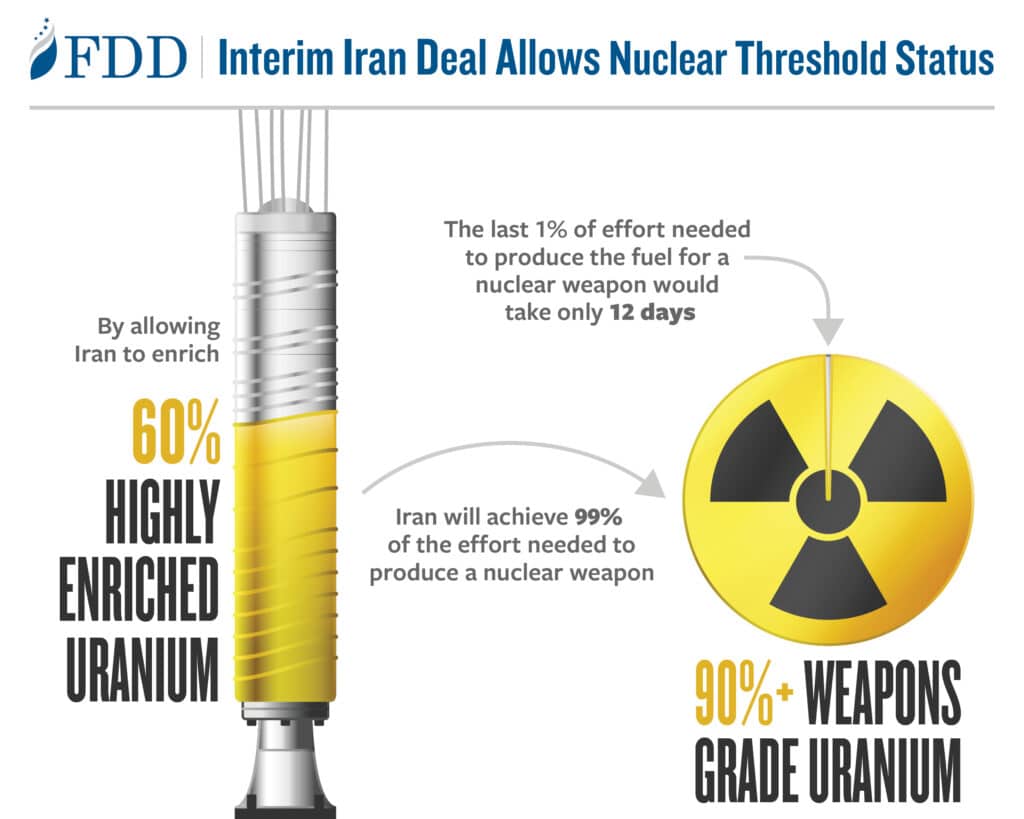August 25, 2023 | Policy Brief
Iran’s Nuclear ‘Concession’ May Not Be One at All
August 25, 2023 | Policy Brief
Iran’s Nuclear ‘Concession’ May Not Be One at All
The Wall Street Journal reported on August 11 that Iran has slowed its accumulation of 60 percent enriched uranium — whose production entails 95 to 99 percent of the effort to make weapons-grade uranium (WGU) — as part of a quid-pro-quo arrangement with the United States aimed at reducing tensions. Yet this concession is unlikely to have an impact on Tehran’s breakout time, that is, the amount of time it requires to produce fuel for atomic weapons.
The United States and Iran reportedly reached their agreement via indirect talks in Oman last spring. According to The Wall Street Journal, in recent weeks, Iran has diluted a small but unknown amount of 60 percent material to a lower enrichment level and “slowed the rate at which it is accumulating new material.”
Overall, however, Tehran’s stockpile of 114.1 kilograms (kg) of 60 percent enriched uranium, which the International Atomic Energy Agency reported Iran possessed as of May, likely increased. The administration will try to spin the reported dilution as an Iranian concession, but Tehran remains on the nuclear threshold and able to produce fuel for an atomic weapon in as little as 12 days.
Iran has thousands of kilograms of uranium enriched at or near purity levels of 2, 5, 20, and 60 percent. The latter three purity levels factor into any potential breakout effort Tehran might undertake, and therefore it is critical to eliminate each in a rollback effort.
According to the Institute for Science and International Security, once Iran decides to pursue nuclear weapons, it could use some of its 60 percent stocks to produce enough WGU — uranium enriched to 90 percent — for one nuclear weapon in 12 days. During the first month of a breakout, Tehran could use some of its 60 percent and 20 percent stocks to produce WGU for four additional nuclear weapons.

During a second month, using the remainder of the 60 and 20 percent stocks along with some 5 percent enriched uranium, Iran could produce WGU for two additional weapons. During a third month, it could use its stock of 5 percent material to produce WGU for one more weapon, for a total of eight weapons overall. Western intelligence agencies estimate that Iran would require several additional months to fabricate the WGU into nuclear explosives.
The process of making 5, 20, and 60 percent enriched uranium represents most of the effort required to make WGU. For example, depending on a variety of factors and inputs, 20 percent enrichment entails roughly 90 percent of the effort to make WGU, while 60 percent enrichment entails 95 to 99 percent of the effort. Therefore, the administration must determine whether Tehran will continue adding to its 5 and 20 percent stockpiles, negating any impact of a reduction in its 60 percent stockpiles.
Unfortunately, the Biden administration authorized Iraq and South Korea to unfreeze some $16 billion in Iranian assets in return for what amounts to a false concession on Tehran’s 60 percent enriched uranium stock. This greatly reduces the administration’s leverage to obtain additional nuclear rollback.
The administration should stop unfreezing Iran’s assets and return to a policy of pressure against Tehran. A first step is to enact the “snapback” of United Nations sanctions resolutions on Iran and restore the multilateral demand that the regime halt enrichment of uranium altogether. Next, Washington should insist that Iran dispose of or ship out all enriched uranium and associated infrastructure.
The permanent dismantlement of Iran’s enrichment infrastructure under international monitoring is the only way to ensure the regime will be unable to use nuclear blackmail in the future.
Andrea Stricker is a research fellow and deputy director of the nonproliferation and biodefense program at the Foundation for Defense of Democracies (FDD). For more analysis from Andrea and FDD please subscribe HERE. Follow Andrea on X, formerly known as Twitter, @StrickerNonpro. Follow FDD on X @FDD. FDD is a Washington, DC-based, nonpartisan research institute focused on national security and foreign policy.